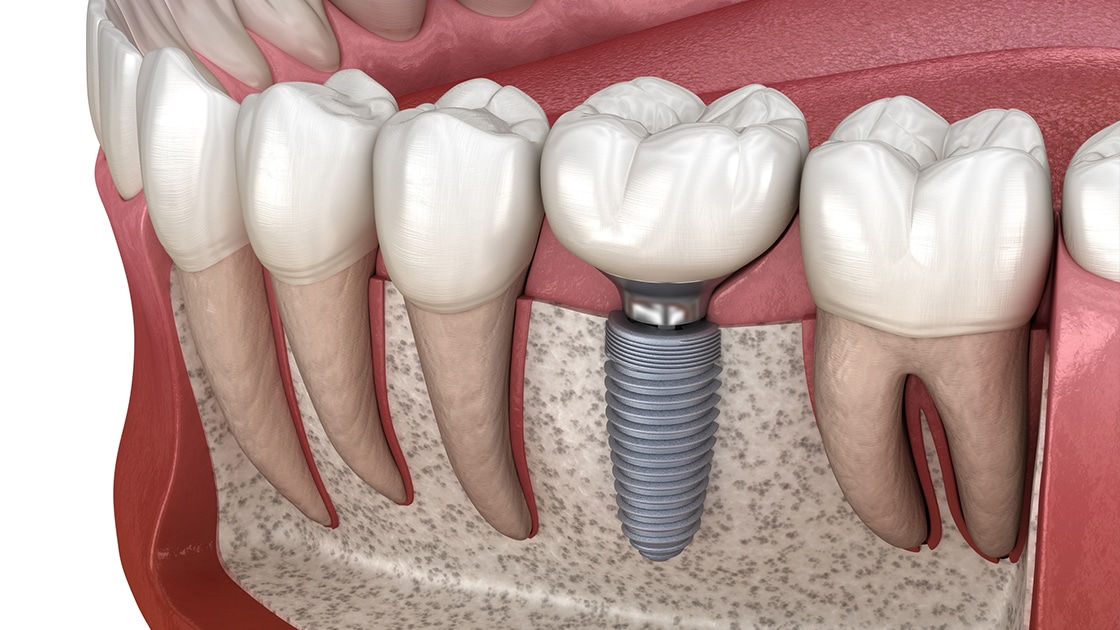The 25-Second Trick For Dental Sense
Table of ContentsThe Definitive Guide for Dental SenseEverything about Dental SenseMore About Dental SenseDental Sense for Dummies
are medical gadgets surgically implanted into the jaw to bring back an individual's capability to chew or their appearance. They give assistance for fabricated (fake) teeth, such as crowns, bridges, or dentures. When a tooth is lost due to injury or illness, an individual can experience difficulties such as fast bone loss, faulty speech, or modifications to eating patterns that lead to pain.Oral implant systems are composed of an oral implant body and oral implant joint and may also consist of an abutment addiction screw. Dental implants. The oral implant body is operatively put in the jawbone in place of the tooth's root. The oral implant abutment is usually affixed to the dental implant body by the abutment fixation screw and prolongs with periodontals into the mouth to support the attached synthetic teeth
(https://dentalsense.godaddysites.com/f/transform-your-smile)Framework of The Dental Implant System picking oral implants, speak to your oral provider about the prospective benefits and threats, and whether you are a candidate for the treatment. Points to think about: Your general health is an essential variable in determining whether you are a good prospect for oral implants, just how long it will take to heal, and for how long the dental implant might remain in location.
Smoking might impact the recovery process and lower the lasting success of the implant. The recovery process for the implant body may take a number of months or longer, throughout which time you generally have a short-lived abutment in area of the tooth. the dental implant treatment: Thoroughly comply with the dental hygiene directions provided to you by your dental company.
What Does Dental Sense Mean?
Implant failing can lead to the need for another procedure to deal with or change the implant system. Brings back the ability to chew Recovers cosmetic appearance Assists maintain the jawbone from shrinking because of bone loss Preserves the health and wellness of the surrounding bone and gum tissues Assists keep adjacent (nearby) teeth secure Improves lifestyle Damage to surrounding natural teeth during dental implant positioning Injury to the surrounding tissues throughout surgical procedure, such as sinus perforation Injury during surgical treatment (for instance, fracture of bordering jawbone) Inadequate feature, such as feeling like the teeth do not attack with each other typically A feeling that the tooth is loose or turning in area arising from a joint screw loosening up Implant body failure (looseness of the implant body) due to systemic infection, which might be most likely in patients with unrestrained diabetics issues due to local infection in bone and gums sustaining the implant body as a result of postponed recovery, which may be more probable in individuals who smoke Problem cleansing the gums around the dental implant, causing bad oral hygiene Neglected periodontal disease Post-surgical numbness due to nerve impingement or damages Constantly inform healthcare suppliers and imaging specialists that you have dental implants before any magnetic resonance imaging (MRI) or x-ray procedures.
FDA is not aware of any kind of damaging events reported for MRI or x-ray treatments with oral implants. Dental implants systems are usually made from materials that comply with international agreement standards of the International Company for Standardization (ISO) or ASTM International. These criteria have details of what makes a secure material.

A dental implant is a structure that changes a missing out on tooth. With screw-like gadgets, the specialist inserts a dental implant into the jawbone, and it acts as a support for a synthetic tooth, called a crown.
The Greatest Guide To Dental Sense
Some people are not qualified for dental implant surgical procedure. It is for oral doctors to run on individuals with: severe illnessuncontrollable metabolic diseasebone or soft tissue illness or infectionIf these issues are fixed, an individual can have the surgical procedure. In, oral doctors avoid running on individuals with: If people with any one of the above undertake oral implant surgical procedure, there is a greater risk of the dental implant falling short.

Dental dental implant surgical treatment is a customized procedure. It's not the same for everyone. However the complying with offers a general introduction of what you can anticipate your dental practitioner, oral doctor, periodontist or prosthodontist to do: Place the implant surgically. Provide you time to heal. Attach the post and last crown, bridge or denture.
Next, your cosmetic surgeon will very carefully place the oral implant into your jaw. If your dental implant is near the front of your mouth, your dentist will certainly make a Going Here short-lived tooth for you to use until you recover.
5 Simple Techniques For Dental Sense
During the recovery phase, your jawbone needs to fuse to the dental implant. This procedure can take anywhere from 3 to nine months.
When your implant heals, your dental professional can attach the abutment (little adapter article) and your last repair (crown, bridge or denture). This generally takes concerning one hour to complete and may require a second minor surgical procedure. You shouldn't really feel any discomfort throughout your dental implant procedure because your service provider will certainly use medication to numb your gum tissues.